10 beige kitchens that prove this classic neutral is back for 2025
Be persuaded that this classic neutral is the perfect kitchen color to try for 2025

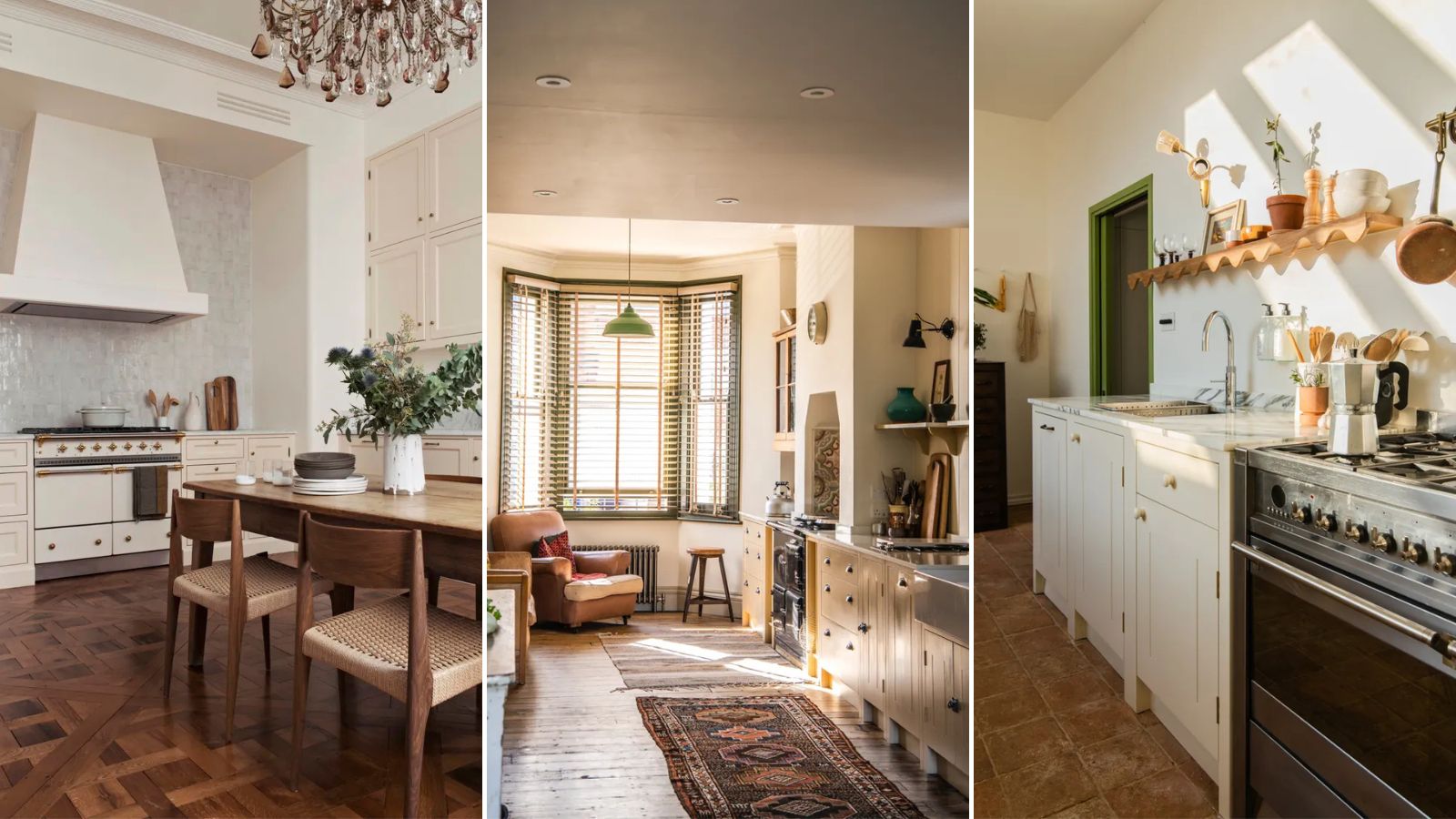
- 1. Choose your beige carefully
- 2. Pair beige and white for a fresher look
- 3. Go for a griege for a cooler take
- 4. Use beige as a background for bolder colors and patterns
- 5. Or layer up neutrals for an on trend tonal effect
- 6. Layer textures too
- 7. Blend classic and contemporary
- 8. Pick beige for a bright and cozy small kitchen
- 9. Ground beige with darker accents
- 10. Mix beige with warm woods for a cozy contemporary feel
Beige kitchens, in fact, beige in general, has an unfair reputation of being boring or dull. But over the last few years, this once boring hue has been making a slow, yet steady resurgence as warm neutrals overtake the ever-popular gray.
Despite being a safe choice for your kitchen color (read that as a timeless choice), it's very much a classic one. And when you are designing a new kitchen that's what you are after, a kitchen that's not too trend-led and won't date in just a few years.
It's such an inviting color too, warmer than white but cooler than a cream kitchen, it's ideal for creating a kitchen that feels cozy and welcoming. So many recent kitchen trends have been based around the idea that we want kitchens that feel less like kitchens, and more like sociable, lived-in spaces and a beige color scheme lends itself so well to this softer approach to kitchen design.
Plus, beige can be adapted to suit any style, whether you are after a country rustic feel or a super modern vibe. We spoke with some of our favorite designers on how they use beige kitchen ideas – how to pick the right tone, what to pair it with, and how to make it work with your style.
10 beautiful beige kitchen ideas to try in 2025
'Beige has been given a bad wrap over the years as being a boring choice of color within a home, however, beige offers a sophisticated neutral backdrop to which other colors, materials, and textures can easily be introduced into a scheme without overwhelming the design. For this reason, beige has never really gone in, or indeed ever will go, out of fashion.' says Ash McCullough, Lead Designer Blakes London.
And Rhiannon Phenis, Head of Design at Sola Kitchens agrees, 'Beige is a refreshing color that is quickly becoming the new white when it comes to kitchen design. It’s the perfect mix between warmth and sophistication, so beige kitchens are becoming very popular. A beige kitchen is perceived as warm, cozy and is the perfect color for those who want a calm and harmonious home. Beige kitchens exude both elegance and harmony and can easily be combined with an array of natural materials and classic details.'
So we have established beige is a perfect color for a kitchen, now let's get inspired with some beautiful examples...
Design expertise in your inbox – from inspiring decorating ideas and beautiful celebrity homes to practical gardening advice and shopping round-ups.
1. Choose your beige carefully
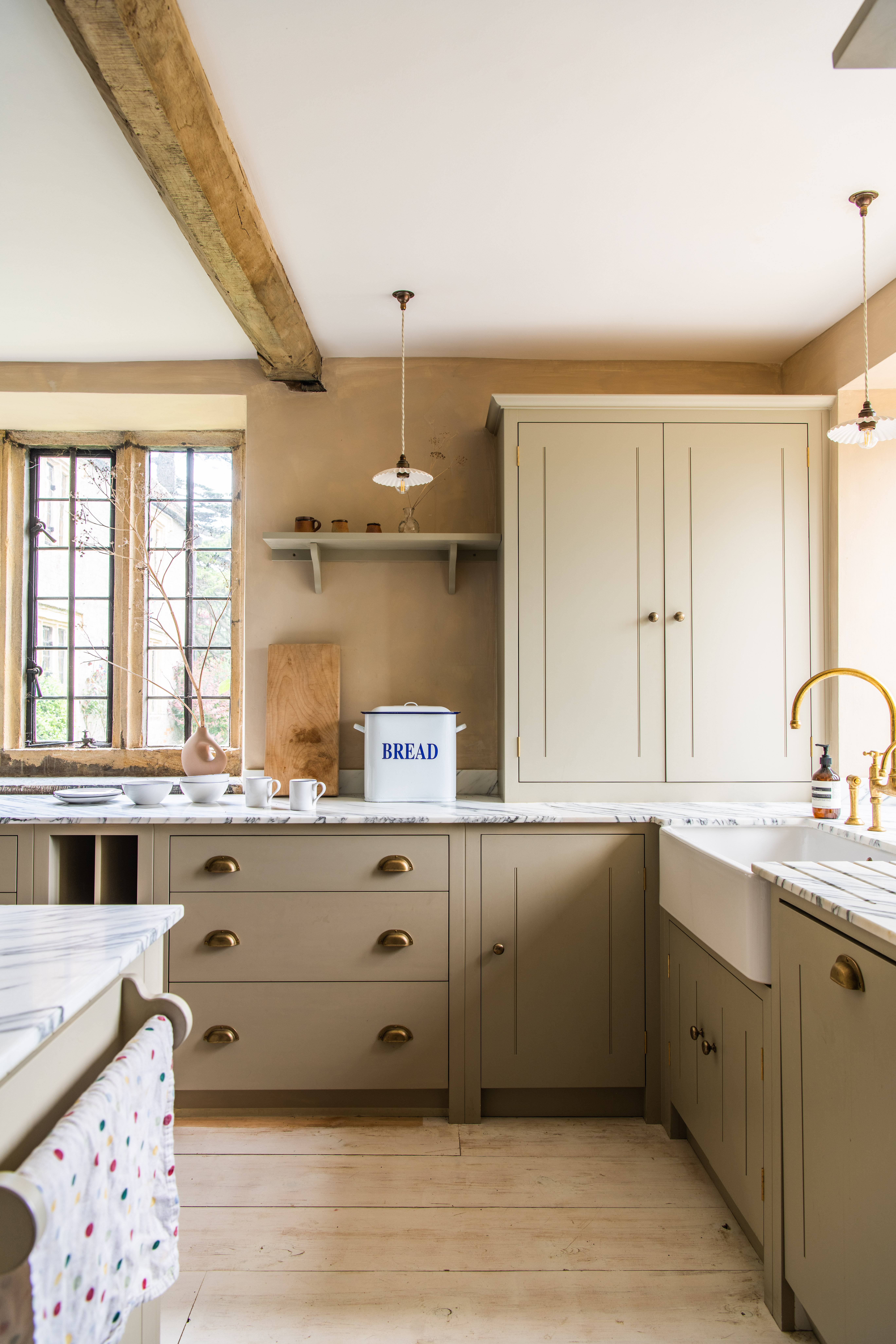
Beige can be a tricky color to get right. But we could say that of any neutral really, gray for example, despite its popularity, can be a nightmare when trying to find the right tone and shade. The key to choosing the right beige for your kitchen color scheme is to look at the aspects of your room, look at the light it gets at different times of day. Are you blessed with plenty of direct sun throughout the day or is your kitchen on the cooler side?
'Softer than white, which in strong south-facing natural daylight can become cold and uninviting, beige can add warmth and depth to a room,' says Ash McCullough, Lead Designer Blakes London. 'Choose your shade of beige carefully as the tones within beige can range from browns and yellows which are often less appealing and feel more dated in modern designs, to the more popular pinks and greens. Once you know which tone you have within your beige be sure to match any complementary colors to that tone in order to create a harmonious palette within your kitchen.'
Patrick O’Donnell, Farrow & Ball brand ambassador, adds that 'As with every design process, think about all the elements to be included in your kitchen such as worktops, hardware, flooring and possibly fabrics. Create a mood board and then add your considered paint swatches of beige. Some may err on the side of gray, some may have a drab yellow quality and some may be considered pale brown in tone so try to find one that fits with everything else. Any colors are often best to consider near the end of the design process but especially in the case of your kitchen which is possibly the largest investment you will make in your interior planning. Stony Ground or Fawn, the latter from our archive are both great beige shades.'
2. Pair beige and white for a fresher look
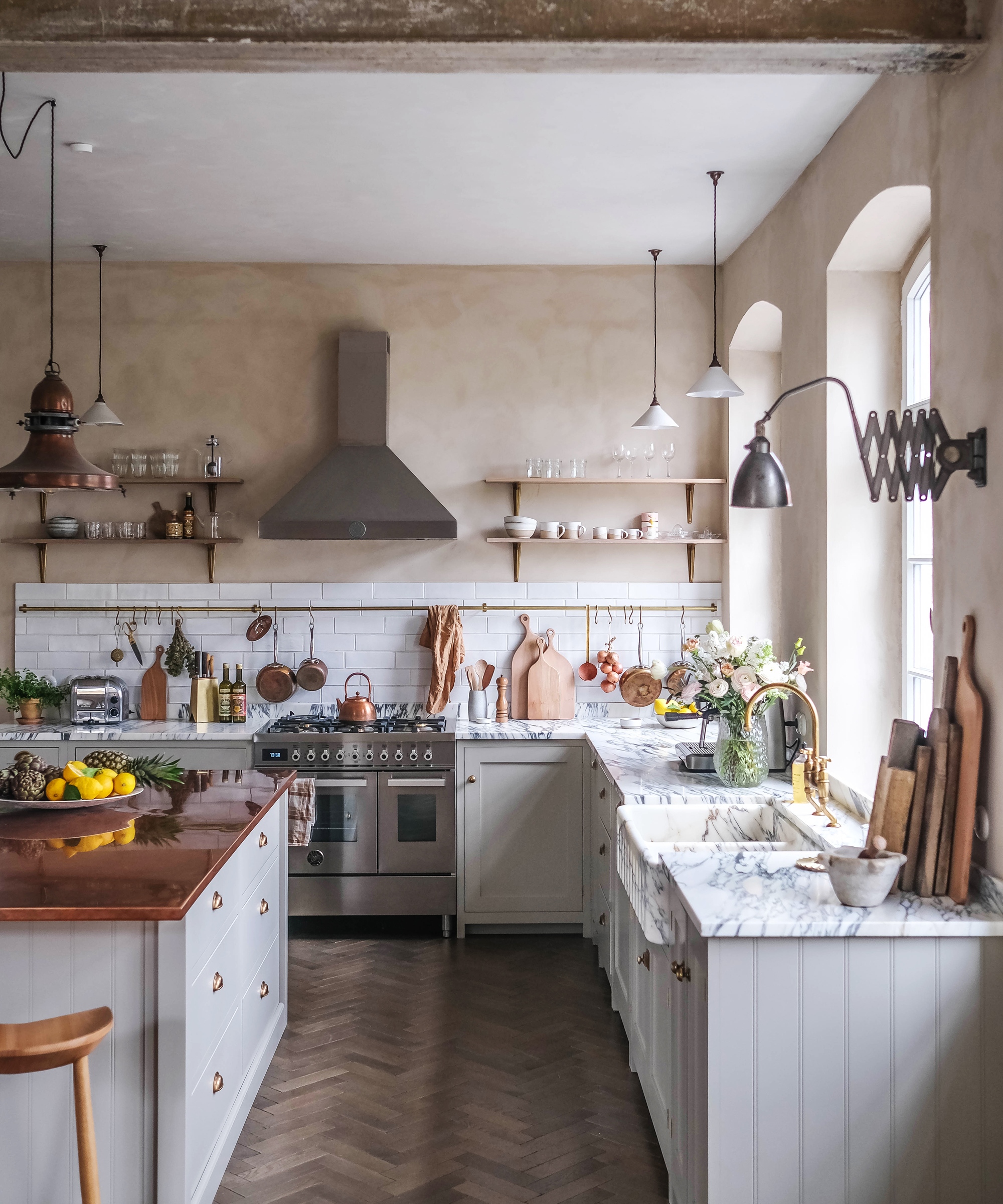
We love the softness and warmth of beige, but it is a color that benefits from a bit of a lift, and pairing it with a heavy dose of white will do just that. Likewise, a white kitchen can benefit from a touch of beige too to prevent it from looking too harsh and clinical. There's enough of a contrast between beige and white so you will notice a difference and you'll see that freshness of the white against the slubby beige, but it's not going to interrupt a neutral scheme.
'Don't forgo white entirely,' suggests Rhiannon Phenis, Head of Design at Sola Kitchens. 'A beige cabinet kitchen looks great against white walls or paired with white countertops because of the subtle contrast between the two colors. Use a light color on the walls to brighten the decor, cream, white, and buttercup yellow all help to reflect the light, and make the room look brighter.'
A white backsplash does the job here to lift the warmer colors and give the space a bit more of a focus.
3. Go for a griege for a cooler take
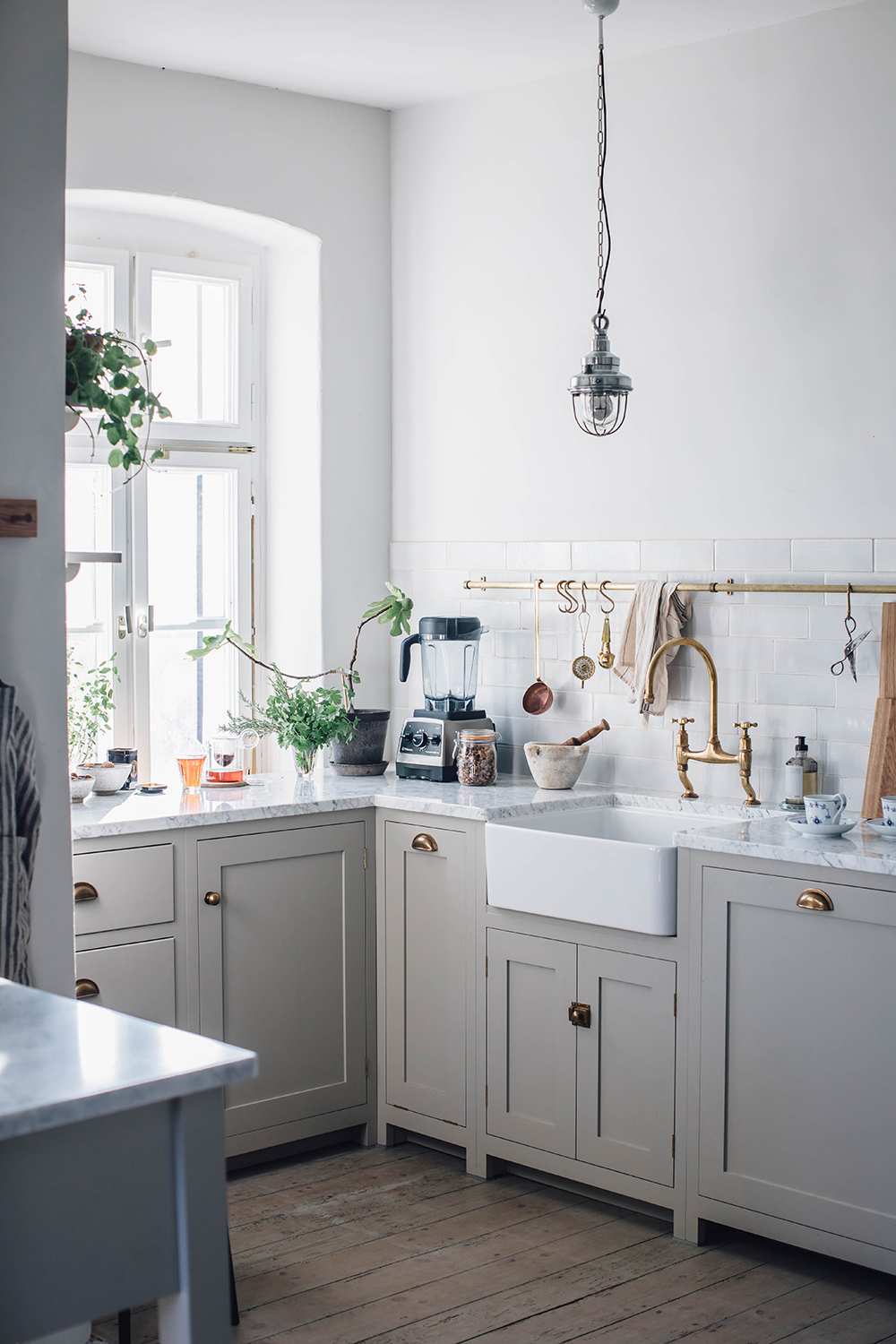
Gray kitchens are a classic, but we all know kitchen trends are pointing towards kitchens that feel, well less like kitchens. We want kitchens to be welcoming and cozy and in many ways feel more like a living room. Gray in its steeler forms, just doesn't align with that comforting, homey aesthetic. Griege, however, does.
It is what it sounds like, a mix between gray and beige to get a cooler shade that still has the warmth of beige, just with less yellow, brown undertones. This deVOL kitchen demonstrates the shade perfectly – it's painted in their Mushroom shade, a beige hue with a blueish tint.
Helen Parker, Creative Director of deVOL says, 'It's one of our favorite colors for a kitchen, it seems to work wherever it goes, soft and warm yet light enough for even the darkest of corners. The classic combination of Carrara marble and Mushroom paint is always perfect. It's almost a deVOL look in itself and has graced literally hundreds of our most coveted rooms.'
4. Use beige as a background for bolder colors and patterns
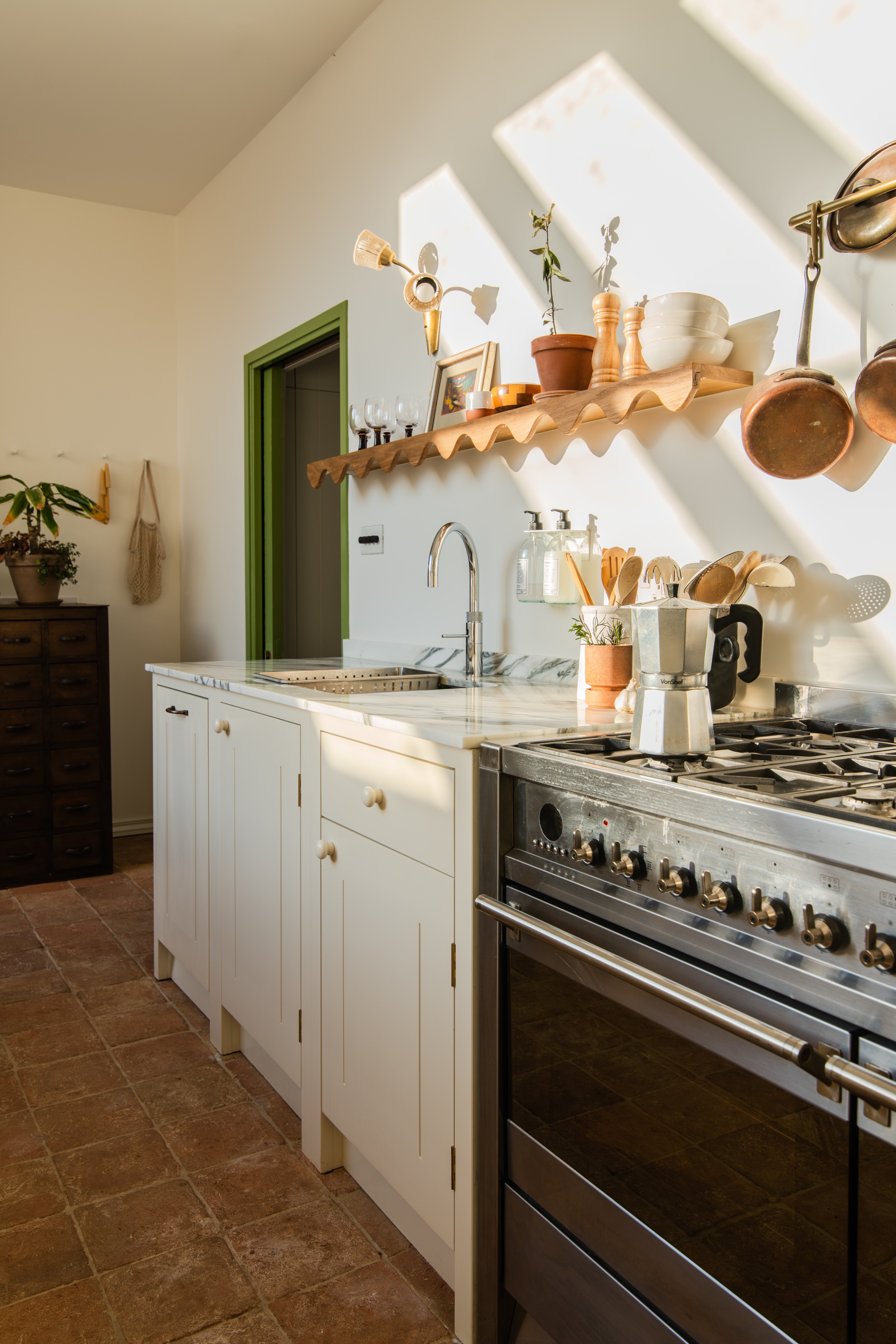
Colorful kitchens are such a joy. We love a blue kitchen or a green kitchen as much as the next person. But when going for a bold color for your kitchen cabinets you really have to know you are going to love the shade for years to come – and there's risk here. But beige, well beige isn't going to date anytime soon, so you know you won't need to be painting your cabinets in a couple of years, and it's the ideal backdrop for bringing in bolder hits of color. Case in point – the green accents that run throughout this beige kitchen by British Standard.
'Using a neutral color like beige opens up the opportunity to use color and pattern, because it’s so versatile,' suggests Rhiannon Phenis. 'For example, installing decorative flooring as this creates a focal point and can add an exciting element to the space. Add texture in the form of ribbed detailing in the cabinetry if you are worried that a neutral kitchen could feel flat or ordinary. A beige kitchen with a contemporary and curved line of cabinets with slatted surfaces can give the space an architectural look. Combining beige cabinets with brass hardware will also refresh the appearance of the kitchen.'
5. Or layer up neutrals for an on trend tonal effect
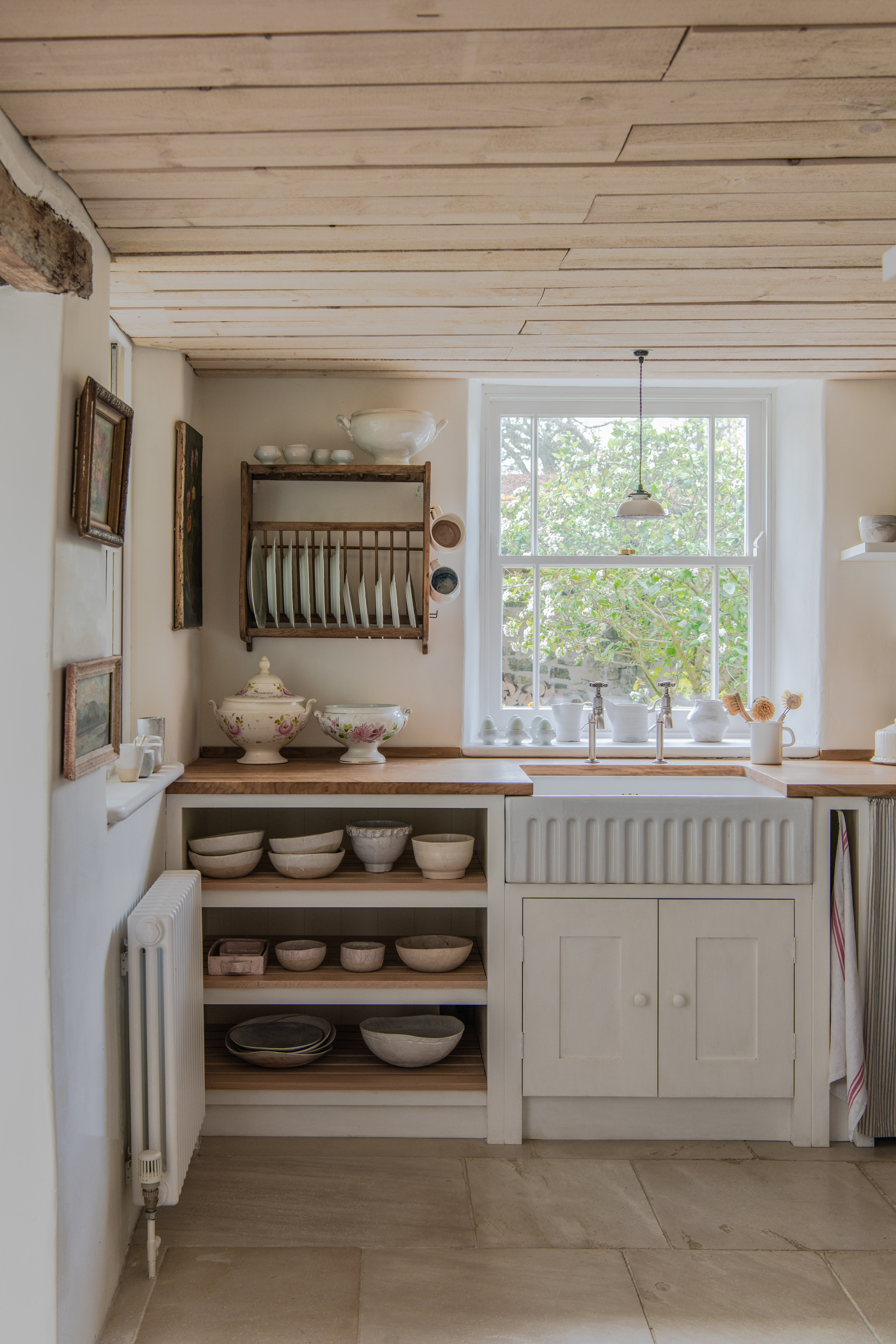
And you can add interest to a beige kitchen by layering it with other neutrals too to create that very on-trend tonal effect. Pair beige with whites, creams, soft browns, and terracotta for a soft but stylish space. And you don't need to just bring in these colors in the form of paint – see how in this kitchen woods and stone and ceramics help create that layered, textured effect too.
'I absolutely love a beige kitchen!' says Bianca Betancourt, designer at FORM. 'It is the perfect color for anyone who desires a warm, inviting, neutral & modern aesthetic. Beige is extremely popular and trendy at the moment however, it is a color that will age gracefully and will always circle back in style.'
'Beige pairs beautifully with organic colors and soft textures such as natural stone, concrete, creamy, and taupe color palettes as well as minimal wood tones with consistent grain. The key is to pair beige kitchen cabinets with neutral undertones for the surrounding details & architectural elements.'
6. Layer textures too
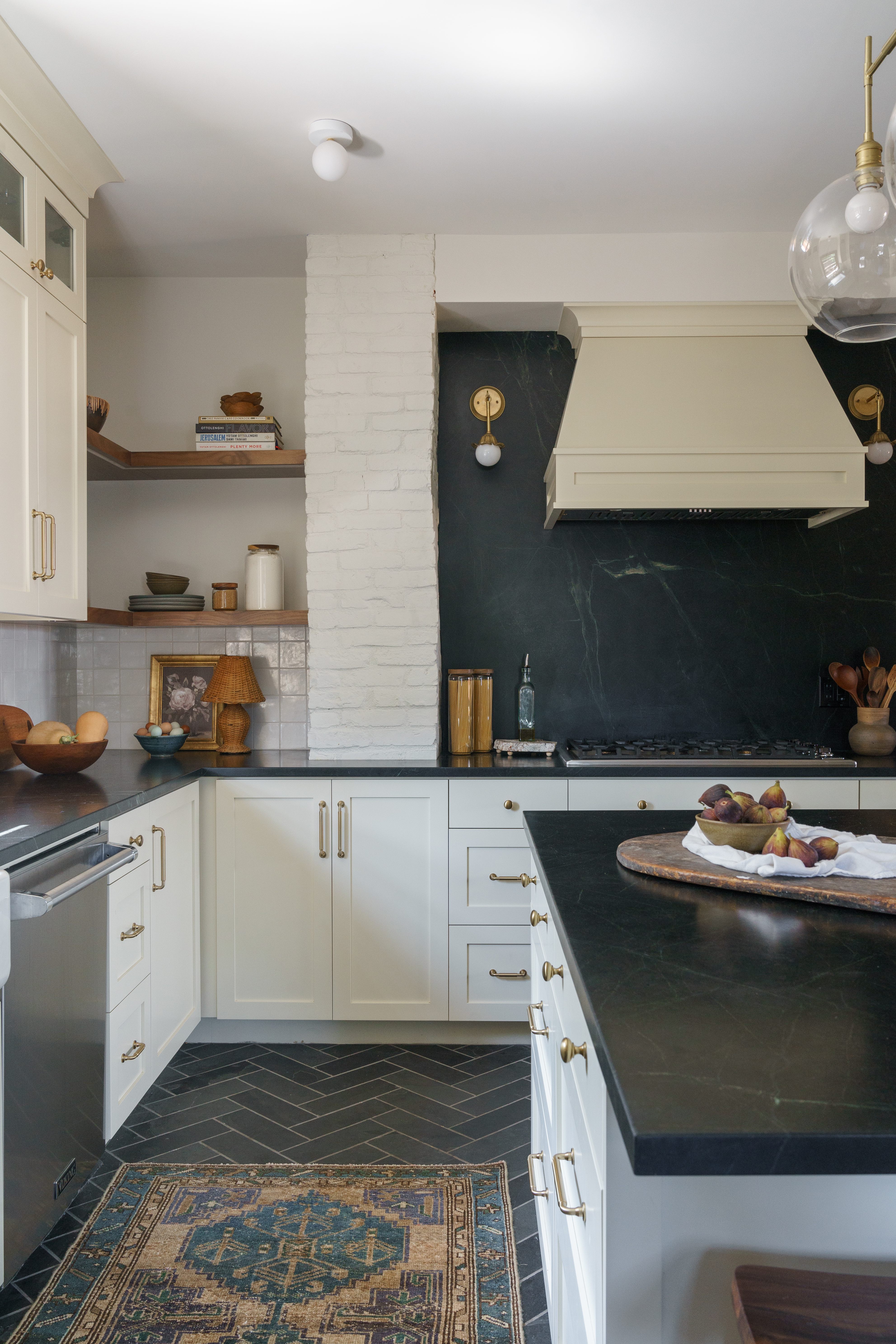
In any neutral space, textures are essential. The color palette is simple so in order to give the room some depth and interest, you need to bring in differing materials and finishes. In a kitchen that's super easy – tile, stone, marble, brick, will all add contrast even if you stick with a mostly beige scheme. Rugs, prints, lighting, and ceramics can be used to add to those layers of textures too.
'This historical craftsman already oozed with charm. The kitchen was completely reconfigured and all new materials were selected,' explains designer Abbie Naber. 'We kept some of the original brick structure and chose a material palette that was fresh and updated but still made sense with the architecture. We opted for velvety soapstone, herringbone slate, and of creamy, soft paint hues. Beige was the way to go in this space as anything too bright would not have worked with the craftsman style of the home.'
7. Blend classic and contemporary
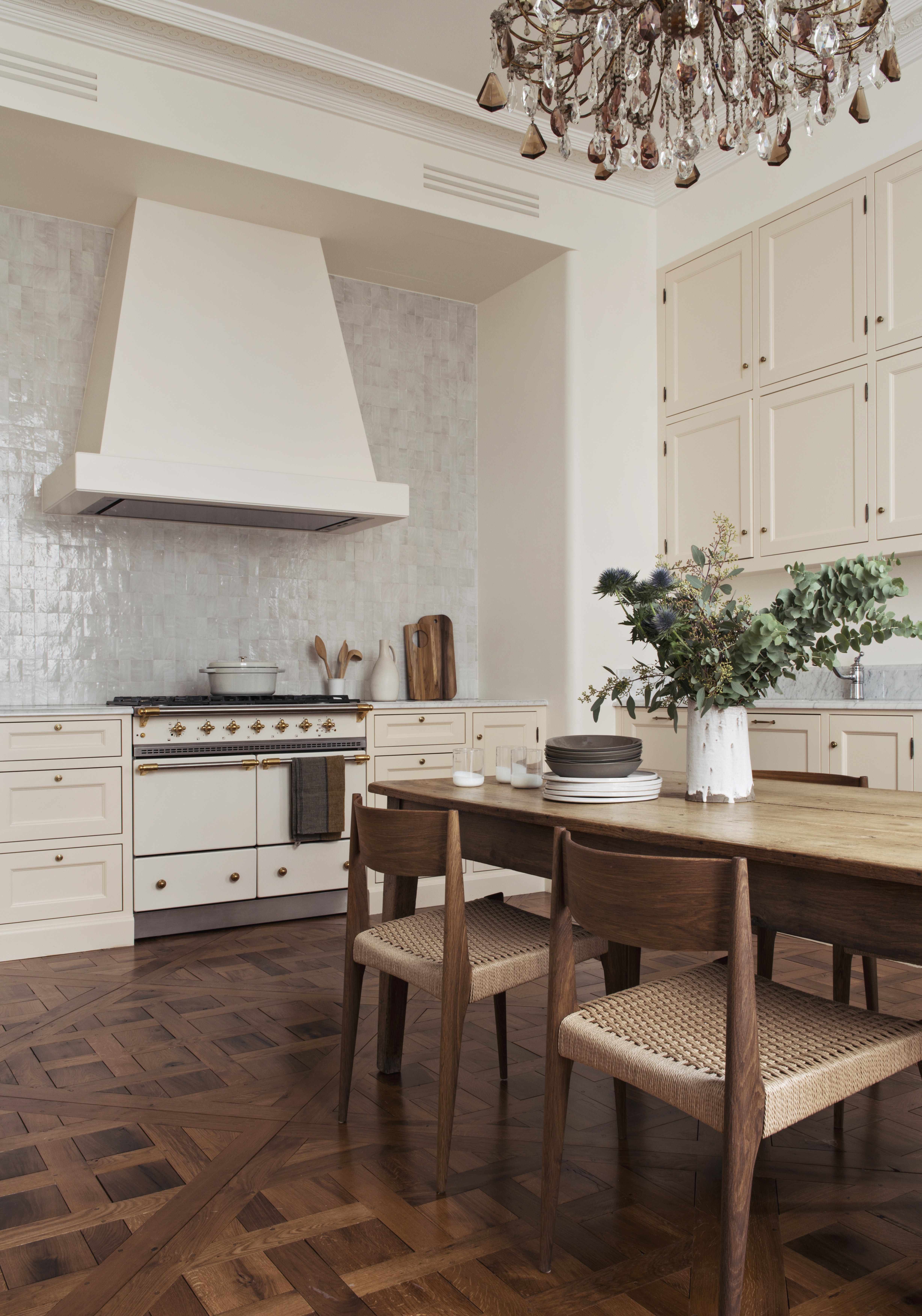
One thing all our favorite kitchens have in common is that they don't just draw influence from one style. The most beautiful kitchens blend styles together to create a space that feels character and unique. A beige color scheme is an ideal place to start when designing a kitchen that nods to both old and new, classic and contemporary. Beige is neutral, it doesn't lean into one particular style, so is a great base color.
In this kitchen designed by Kasha Paris, the elegant beige kitchen cabinets fit perfectly with the original wooden flooring and features of the room. But shade also has no issue being a backdrop for the more contemporary shape of the dining chairs and table or the rustic feel of the zellige tiles.
'This kitchen blends classical and contemporary,' explains Betsy Kasha, co-founder of Kasha Paris. 'We chose simple colors that let the pieces speak for themselves and allow elements from different eras to work together. We also tend to select lighter colors on top to draw the eye up, finishing with a white ceiling.'
'The trick is to vary the tones and materials to bring light and texture. And do not hesitate to create contrast with a marble countertop or stark white ceiling. I tend to prefer warm tones of beige that are closer to cream. The warmth works particularly well with honey undertones in a classic wood floor.'
8. Pick beige for a bright and cozy small kitchen
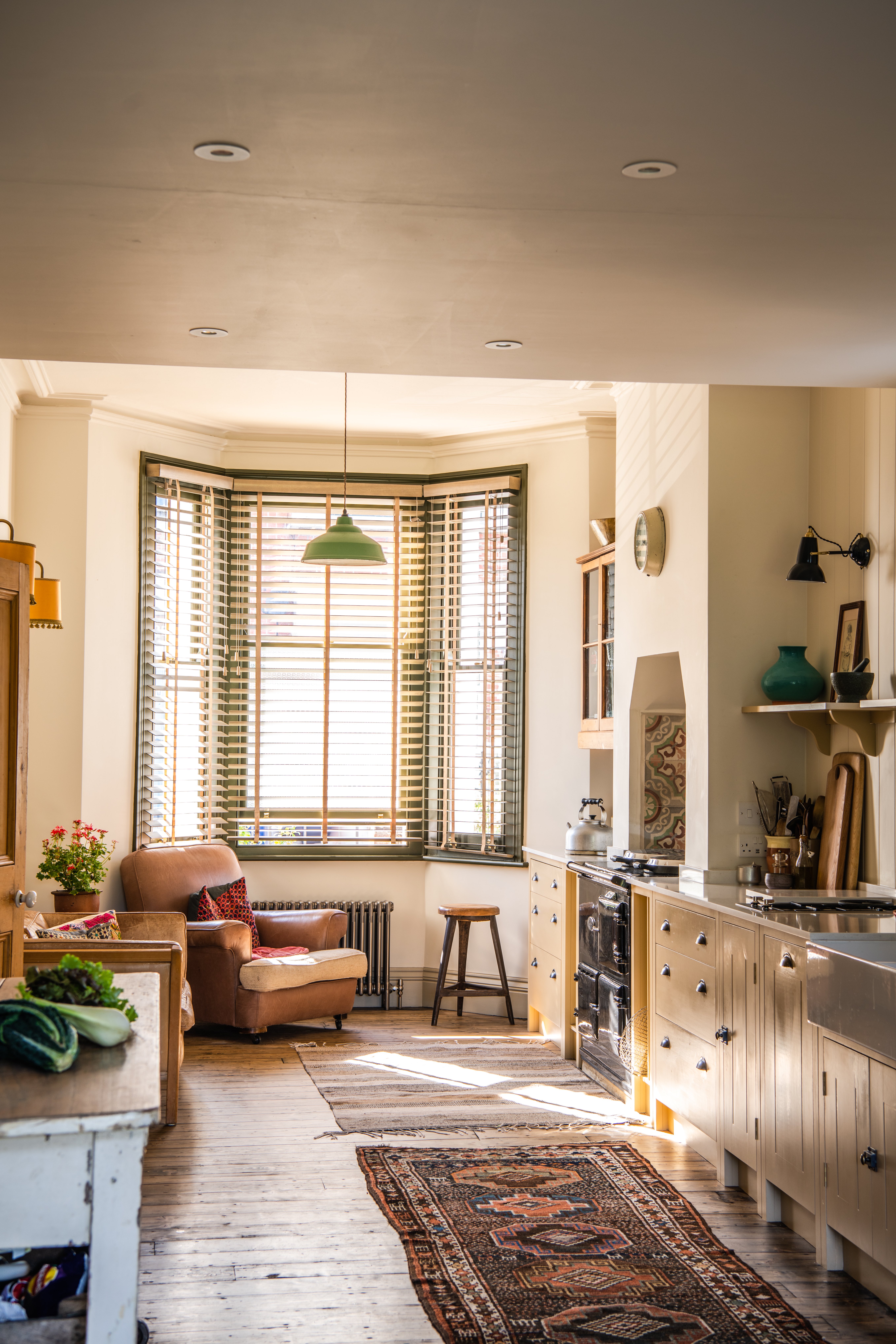
When it comes to small kitchen colors neutrals are a safe bet. Not to say neutrals are boring, but when you are squeezed for space and unsure what's going to work, stick with neutrals. White, despite all its space-expanding properties, can leave a small kitchen looking a bit flat and cool and characterless, whereas a beige will brighten the space, but also make it feel warm and welcoming.
'Opting for a pale neutral is the obvious way to keep a small kitchen light, bright, and feel spacious. It's also an ideal backdrop for injecting character as it allows you to play around with pops of colors elsewhere in the room.' says Will Eaves Design and Development coordinator at British Standard.
This small kitchen is almost color-drenched in the loveliest, yellowy beige. The neutral color helps to make the space feel bigger but also acts as the perfect backdrop for characterful decor.
9. Ground beige with darker accents
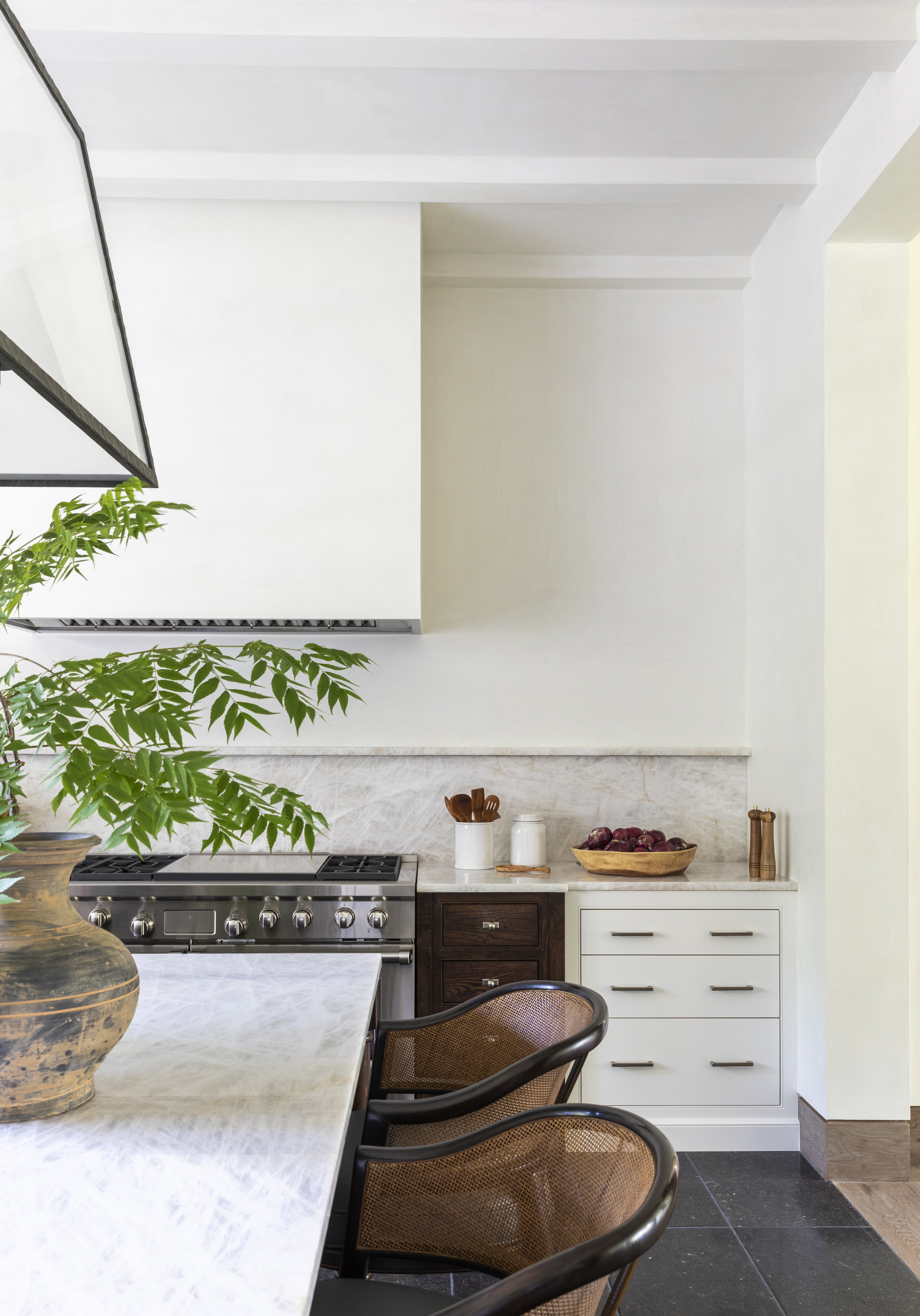
Black and white kitchens are a classic, but this combo does risk looking a bit stark and if you don't bring in the right decor the contrast can be too much. So tone it down and opt for a beige over a white. The darker accents will still work to ground the neutrals and add some focus to the room, but the overall effect will be far softer.
'Beige is incredibly versatile. I love how beige can still read light and bright, but offers additional saturation to the space. Just make sure to avoid any beige colors with overly yellow or brown undertones when trying to keep the room feeling fresh,' says designer Marie Flanigan. 'And beige can be anything but boring when you pair it with the right complementing and contrasting elements.
'This space was all about the juxtaposition of light vs. dark. The dark floors were a nice contrast to the light and bright paint and countertops. Then, we layered in dark accents like the cane back barstools. The paint color is slightly warmer which makes for beautiful contrast as opposed to a severe transition.'
10. Mix beige with warm woods for a cozy contemporary feel
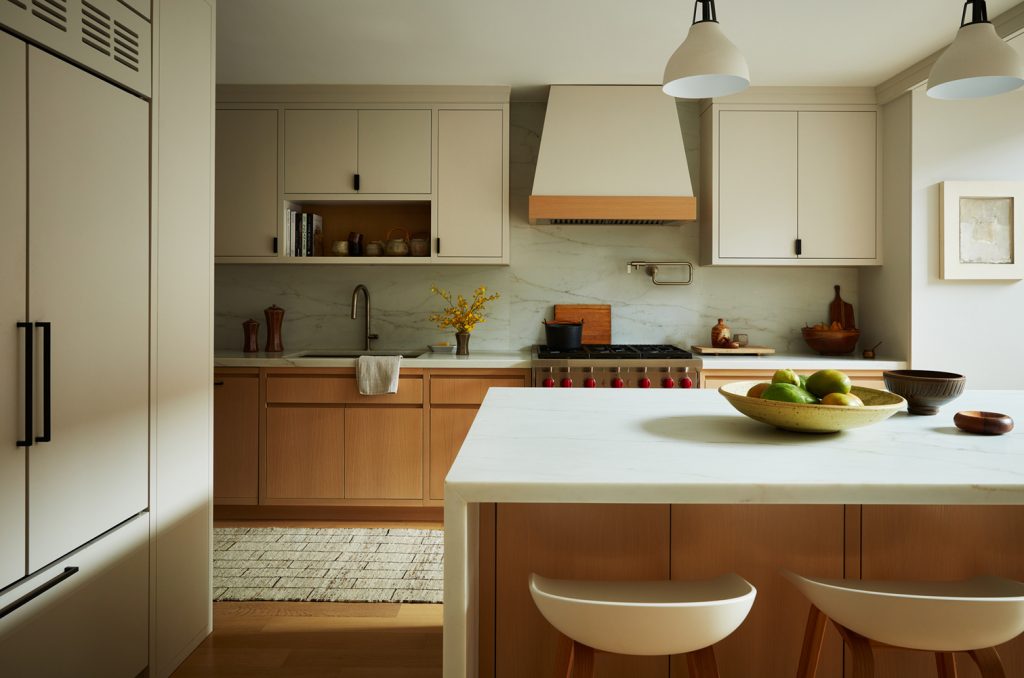
Beige and wood are the perfect combo in a kitchen. If you want to break up a wall of cabinetry, mix and match – upper cabinets painted beige, lower cabinets a gorgeous honey-toned wood. Of course, this combo would work in more traditional kitchens too, but will love the contemporary feel of this kitchen designed by J. Patryce Design.
'Frequent entertainers and hosts, our clients wanted a functional, well-designed kitchen (the wife is an outstanding cook). Having spent her formative years in Europe, we channeled the wife’s roots with a fresh, clean palette and natural materials. We turned to classic, warm neutrals such as Calacatta and white rift oak for a timeless, warm modern design.' explains Joan Enger, principal of J. Patryce Design & Company.
So as these 10 beige kitchens prove, this once-shunned shade is back and is the perfect shade to decorate the heart of your home. Super versatile and really easy to use, it's the perfect color for creating a chic yet cozy kitchen.

I am the Head of Interiors at Homes & Gardens. I started off in the world of journalism in fashion and luxury travel and then landed my first interiors role at Real Homes and have been in the world of interior design ever since. Prior to my role at H&G I was the digital editor at Livingetc, from which I took a sabbatical to travel in my self-converted van (not as glamorous as decorating a home, but very satisfying). A year later, and with lots of technical DIY lessons learned I am back to writing and editing, sometimes even from the comfort of my home on wheels.